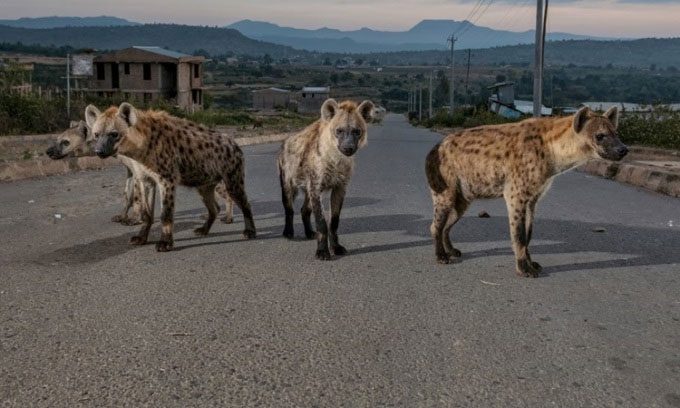In an ancient city in eastern Ethiopia, residents feed a pack of hyenas in exchange for their help in cleaning the streets and warding off evil spirits.
The hyenas gather as night falls over Harar. These bold creatures arrive early, wandering around without a care for the loud horns blaring from the nearby shrine, calling people to prayer. When Abbas Yusuf arrives, dozens of hyenas wait in the dim light. Abbas whistles and tosses out some meat. He then guides a group of tourists to take turns feeding the hyenas with meat hanging from long sticks, according to Guardian.

Hyenas on the streets of Harar. (Photo: Guardian).
In other parts of Ethiopia and many regions across Sub-Saharan Africa, hyenas are often feared and carry a bad reputation. News reports frequently claim they prey on children. Across Africa, humans often clash with hyenas, especially as residential areas expand. This large carnivore kills people and livestock, while also frequently being poisoned and killed in retaliatory attacks. However, in the city of Harar, their presence is accepted and even encouraged, according to local scholar Ahmed Zekaria.
While brown hyenas and striped hyenas are classified as “near threatened,” spotted hyenas are not endangered but their numbers are declining. Due to increasing conflict with humans and shrinking habitats, how communities can coexist with this large predator is becoming an urgent issue.
In Harar, hyenas serve as the city’s waste management system, appearing at night through a series of gates in the city walls to eat leftover food discarded on the streets. Abbas is one of the people who has developed a close relationship with the hyena pack in the city. He learned from his father, Yusuf, who began tossing leftovers to the hyenas while feeding dogs decades ago. Abbas’s bond with the hyena pack is so strong that he has named all of them. Although most members of the pack are reluctant to eat directly from his hand, the friendlier hyenas often run to his house. “I feed them every night, regardless of whether there are tourists or not,” Abbas shares.
One of Abbas’s favorite hyenas is an elderly female named Chaltu. A few months ago, she wandered into an office building in the city and was beaten with a stick by security. When Abbas heard the news, he arranged for an ambulance and took her back to his farm to care for her until she recovered. Like many Muslims in Harar, Abbas and his father believe that hyenas can protect humans from evil spirits.
In a broader effort to promote tourism, the Ethiopian government is keen on leveraging the relationship between Abbas and the hyena pack. Currently, he feeds them in a vacant lot, which is set to be replaced by a $2.5 million eco-park featuring a shop, café, and museum. Authorities hope the project will attract more tourists. However, the development could threaten the relationship between the city and the hyenas, as new structures may block many of the routes the hyenas have traditionally used.





















































